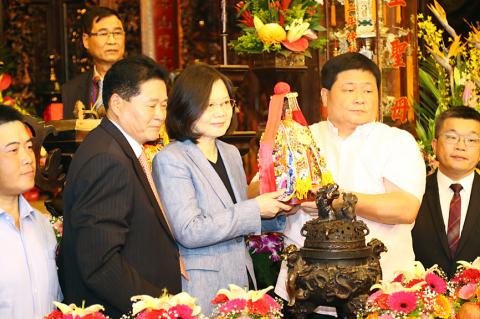President Tsai Ing-wen (蔡英文) was listed eighth in a list of the world’s 50 greatest leaders in Fortune magazine’s latest annual ranking.
The list was released on Thursday, the New York-based business magazine’s fourth annual ranking of world leaders.
The section introducing the Taiwanese president said that Tsai captured headlines in December last year when she telephoned then-US president-elect Donald Trump, the first known call between Taiwanese and US leaders since 1979.

Photo: Chang Hsuan-che, Taipei Times
That year, Washington withdrew diplomatic recognition from Taipei in favor of Beijing.
“It was a bold move for Taiwan’s first female president, who is steering a cautious path between the US and China,” Fortune said.
Describing Tsai as sympathetic to independence, the magazine said that when Beijing tried to punish Taiwan after her election victory in January last year by restricting the number of Chinese visiting the nation, she wooed tourists from Southeast Asia and sparked a tourism boom.
Tsai has also pushed economic reforms, including shortening the workweek to five days from six, it added.
The list covers government, philanthropy, business and the arts, and focuses on “men and women who are transforming the world and inspiring others to do the same,” Fortune said.
Other leaders on the list include German Chancellor Angela Merkel, ranked 10th, Canadian Prime Minister Justin Trudeau, at 31st, and Lithuanian President Dalia Grybauskaite, 45th.
Heading the list are Theo Epstein, president of baseball operations for the Chicago Cubs, last year’s World Series champions; Jack Ma (馬雲), executive chairman of China-based e-commerce company Alibaba Group Holding Ltd (阿里巴巴); and Pope Francis.
In April last year, Time magazine listed Tsai among the 100 most influential people in the world that year.
In June of the same year, she was ranked the 17th-most powerful woman in the world by US magazine Forbes.

Authorities have detained three former Taiwan Semiconductor Manufacturing Co (TMSC, 台積電) employees on suspicion of compromising classified technology used in making 2-nanometer chips, the Taiwan High Prosecutors’ Office said yesterday. Prosecutors are holding a former TSMC engineer surnamed Chen (陳) and two recently sacked TSMC engineers, including one person surnamed Wu (吳) in detention with restricted communication, following an investigation launched on July 25, a statement said. The announcement came a day after Nikkei Asia reported on the technology theft in an exclusive story, saying TSMC had fired two workers for contravening data rules on advanced chipmaking technology. Two-nanometer wafers are the most

Tsunami waves were possible in three areas of Kamchatka in Russia’s Far East, the Russian Ministry for Emergency Services said yesterday after a magnitude 7.0 earthquake hit the nearby Kuril Islands. “The expected wave heights are low, but you must still move away from the shore,” the ministry said on the Telegram messaging app, after the latest seismic activity in the area. However, the Pacific Tsunami Warning System in Hawaii said there was no tsunami warning after the quake. The Russian tsunami alert was later canceled. Overnight, the Krasheninnikov volcano in Kamchatka erupted for the first time in 600 years, Russia’s RIA

CHINA’s BULLYING: The former British prime minister said that he believes ‘Taiwan can and will’ protect its freedom and democracy, as its people are lovers of liberty Former British prime minister Boris Johnson yesterday said Western nations should have the courage to stand with and deepen their economic partnerships with Taiwan in the face of China’s intensified pressure. He made the remarks at the ninth Ketagalan Forum: 2025 Indo-Pacific Security Dialogue hosted by the Ministry of Foreign Affairs and the Prospect Foundation in Taipei. Johnson, who is visiting Taiwan for the first time, said he had seen Taiwan’s coastline on a screen on his indoor bicycle, but wanted to learn more about the nation, including its artificial intelligence (AI) development, the key technology of the 21st century. Calling himself an

South Korea yesterday said that it was removing loudspeakers used to blare K-pop and news reports to North Korea, as the new administration in Seoul tries to ease tensions with its bellicose neighbor. The nations, still technically at war, had already halted propaganda broadcasts along the demilitarized zone, Seoul’s military said in June after the election of South Korean President Lee Jae-myung. It said in June that Pyongyang stopped transmitting bizarre, unsettling noises along the border that had become a major nuisance for South Korean residents, a day after South Korea’s loudspeakers fell silent. “Starting today, the military has begun removing the loudspeakers,”